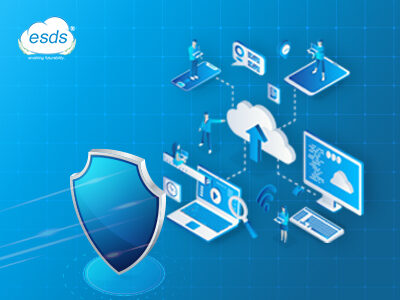Why use a Cloud WAF solution for web application protection?
Organizations are increasingly developing cloud-based web apps to meet their customer’s needs better. Consumer technology services such as online banking, e-commerce, and third-party payment providers are used every day. Businesses are being forced to retain significant volumes of sensitive user data online as a result of these web applications. Consumers expect safe and secure services to manage their money and other personal information.
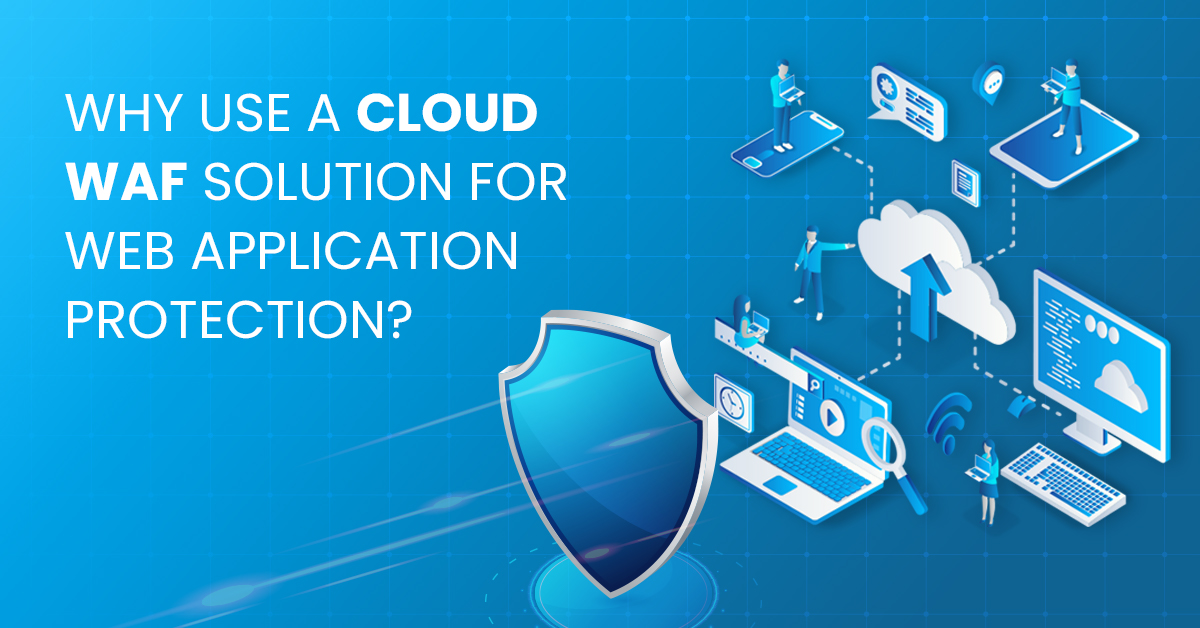
Organizations around the world continue to battle the escalating tide of application-specific and web-application attacks. According to a new report by NTT Application Security, 50% of all sites were vulnerable to at least one exploitable vulnerability throughout 2021. Cybercriminals try to take advantage of flaws in web programs, resulting in disasters for the companies and consumers targeted.
In this post, we’ll look at why businesses that handle sensitive data online should think about using a Cloud Web Application Firewall to protect themselves against dangers like data theft and fraud.
What is a Web Application Firewall in the Cloud?
A cloud-based WAF, or Cloud Web Application Firewall, is one of the most effective solutions for reducing the risk of cyberattacks. A Cloud WAF is a firewall that monitors, filters, and blocks online traffic between and among web applications.
Cloud WAF v/s traditional Firewall
It is a common misconception that a Cloud WAF and a Firewall are the same things; however, this is not the case. Although a Cloud WAF is a firewall, it differs from traditional firewalls because it does not provide perimeter security. Instead, they monitor traffic coming from outside your network and close to your application. Cloud WAFs protect the application rather than the server or servers that host it. Their primary function is to defend public-facing web applications (such as websites and APIs) by filtering and monitoring HTTP traffic, whereas traditional firewalls guard against network threats.
Benefits of Using a Cloud Web Application Firewall
Now that we’ve highlighted the differences between Cloud WAF and traditional Firewalls let’s look at the benefits of using a Cloud WAF solution.
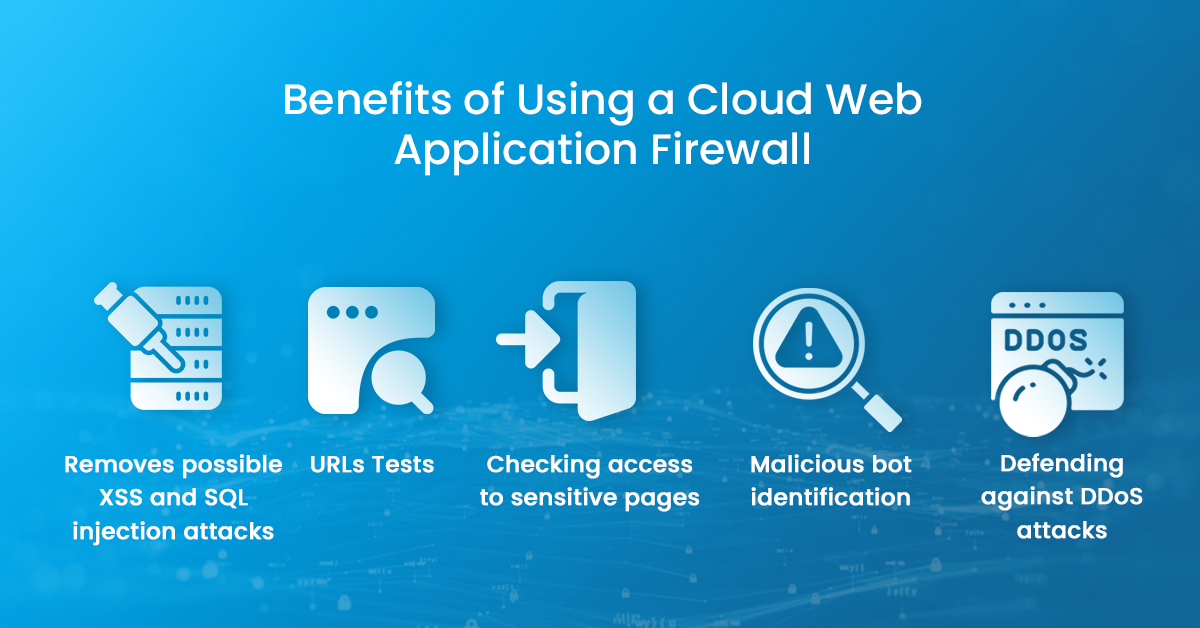
1. Removes possible XSS and SQL injection attacks
XSS (cross-site scripting) is a typical cyberattack that involves injecting malicious code into a vulnerable online application. Another injection attack is SQL injection, which attempts to execute malicious SQL commands. A Cloud WAF may scan your online application and look for code that is typically used in XSS and SQL injection attacks.
2. URLs Tests
Cloud WAFs examine URLs for irregularities or unusual variables, such as SQL code, that could signal an attempted injection attack.
3. Checking access to sensitive pages
Before allowing site visitors access to specified pages, cloud WAFs can validate their credentials. They can be programmed to execute other rules and use IP whitelisting and blacklisting to weed out questionable activities.
4. Malicious bot identification
Cloud WAFs look for and block malicious bots that are designed to scan or exploit web services before they reach your application.
5. Defending against DDoS attacks
A distributed denial-of-service (DDoS) attack tries to flood a website or online service with more traffic than the application server or network can handle. This is done to prevent the website or application from being utilized or accessed in the future. To avoid DDoS attacks, cloud WAFs can limit the number of requests made to your web service by any given IP address. Before your website or service reaches the point of collapse, online traffic is diverted or banned.
Is it necessary for my company to deploy a Cloud WAF solution?
As a general rule, should your company offer services through web apps, websites, or APIs, it would be prudent to deploy a Cloud WAF solution!
However, many services are subject to strict regulatory compliance and may benefit even more from using a Cloud WAF. These are some of them:
- PCI DSS or Payment Card Industry Data Security Standard rules apply to businesses (e.g., PayPal, Amazon, Shopify)
- Any company that collects sensitive information is at risk (e.g., user names, addresses, contact numbers, adhar card numbers, etc.)
Reasons why organizations should use Cloud WAF solution
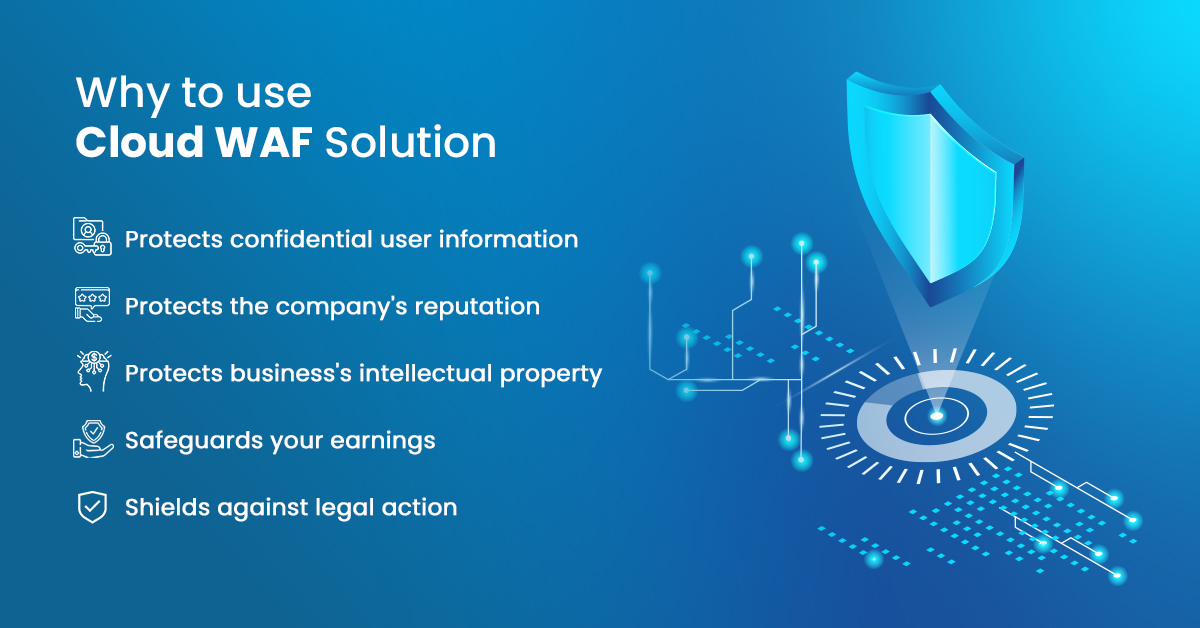
1. To protect confidential user information
Cyber thieves frequently try data theft to obtain credit card details and other personal information. If this information is obtained, it can be used to commit fraud or identity theft. Therefore, any online service that handles sensitive data must have precautions in place to protect consumers from harmful cyberattacks, and deploying a Cloud WAF is one of the most effective methods to do so.
2. To protect your company’s reputation
A data breach might not only expose sensitive information but can also harm your company’s brand. This is because existing customers and members will be less willing to provide you with their personal information.
3. To protect your business’s intellectual property
Cybercriminals frequently try to gain access to proprietary information and various forms of intellectual property by exploiting internet services and web apps. This is done to publish it, sell it to a third party, or coerce a firm into returning it.
4. To safeguard your earnings
If your web application becomes inoperable due to DDoS attacks and exploits, your firm will lose sales until the problem is rectified. Due to a lack of proper security measures, huge firms may lose hundreds of thousands of dollars in income.
5. To shield your company from legal action
Businesses should expect to face litigation and hefty fines in the case of a data breach or the exposure of sensitive information unless they can establish that they took the required procedures to safeguard the data they were entrusted with.
Best Approach to Set Up a Cloud WAF Solution – Quickly and Effortlessly
When implementing a cloud WAF solution, there are two major issues to consider: complexity in implementation and managing expenses.
The in-house configuration of a Cloud WAF solution necessitates forming a team with a highly specialized skill set. You should have an administrator who’s familiar with web applications, servers, software development, and web security best practices and who will monitor the application regularly.
Many companies would rather avoid the significant expense of developing an in-house team. So, what are their possibilities for building an efficient Cloud WAF solution for their services?
One alternative is to employ ESDS’ WAF solution, which takes minimal time for set up and installation and is designed to maximize end-user security. Your website or online service is added to the platform and automatically configured to combat a wide range of cyberattacks, from SQL injections to Cross-Site Scripting and more, once your account is set up.
ESDS designed its own Cloud Web Application Firewall to provide clients with 24/7 security.
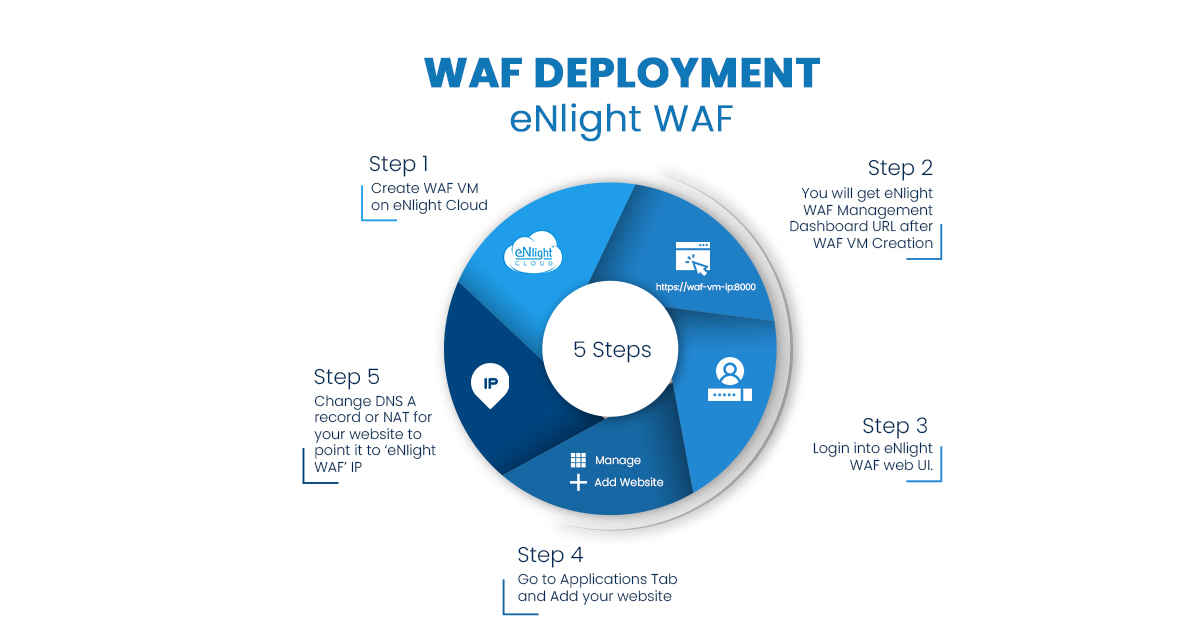
Features of ESDS eNlight WAF
- OWASP Top 10 Defender
Protects your website from the OWASP Top 10 vulnerabilities
- Source IP Reputation Analysis
Analyses IP addresses reputation scores to differentiate legitimate senders from spam sources and block the suspicious ones.
- Comprehensive Dashboard
Provides an intuitive dashboard and rich reports & graphs that provide helpful information and an in-depth view of the WAF cluster.
- Virtual Patching
Quickly develops and implements a short-term security policy to prevent an exploit from occurring when a new vulnerability is discovered.
- Built-in Web Load Balancer
A built-in web load balancer distributes network traffic over numerous servers, ensuring that no one server is overburdened and enhancing application responsiveness.
- High Availability
Offers a wide range of high-availability configuration options, including the ability to add several origin servers when configuring web application delivery. They are helpful when the primary origin servers fail or do not respond appropriately to health checks.
- Customizable WAF Ruleset
Allows customization and configuration of rules that allow, block, or monitor web requests based on the customer’s conditions.
To Conclude
If your business deals with sensitive data via the internet, you’ll need to put in place strong web security measures to secure your data and apps from cyberattacks.
Your company is subject to exploits that can result in service outages, catastrophic data breaches, or even legal and financial penalties if you don’t have proper security. A Cloud Web Application Firewall (Cloud WAF) provides a strong line of defense against a range of typical attacks, and ESDS’ turnkey solution makes employing a Cloud WAF simple and straightforward, allowing for speedy configuration and deployment with just a few clicks.
- Top 5 Data Center Trends for 2024 - October 11, 2023
- Top 15 Cloud Computing Trends 2024 - October 4, 2023
- What is Infrastructure Monitoring and Why Infrastructure Monitoring Tool is Important for Your Business? - September 20, 2023
